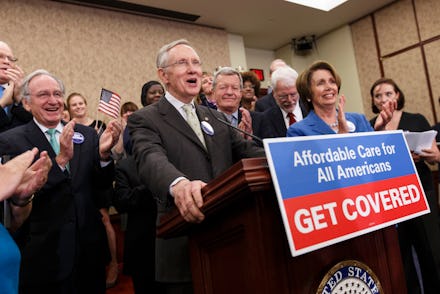Obamacare Facts Show No Matter How You Fudge the Data, It's Bad For Young People

Obama supporters will stop at nothing to clear their president of any economic wrongdoing. It is especially obvious when it comes to defending the Affordable Care Act, aka Obamacare. Whether they're claiming that the ACA hasn't noticeably affected full-time employment or using ratios that don't tell the whole story, their cheerleading efforts are astounding.
But they cannot hide the grim truth: Obama has done a terrible job for the economy. Forgetting his health care reform for a moment, let's look at employment since its last peak.
For the first time since the statistic has been kept, employment hasn't totally recovered. So despite overheating the money-printing press, increasing taxes, and spending billions upon billions to "save" the economy, employment still hasn't recovered after nearly 70 months.
"Those who cannot remember the past are condemned to repeat it", said Spanish author George Santayana, and this is exactly why the economy is still sluggish. Just like Hoover and Franklin Roosevelt, Obama has increased the debt and hindered recovery.
As if his general handling of the economy weren't catastrophic enough, Obama decided to implement the ACA in 2010. Its effects on the economy are well known, even though some decide to ignore them. They are so dramatic that even many influential Democrats want to delay the law's individual mandate one more year. Former supporters are rallying against it because they've realized it means more unemployment.
It also means more part-time employment, as can be shown by this graph taken from the St. Louis Fed.
Since Obamacare became "law of the land", part-time employment is on the rise. What the Employment Policy Institute was referring to when it claimed that the ACA didn't boost part-time employment was part-time employment due to slack work or business conditions. Part-time employment has indeed declined in terms of raw numbers. However, a real economist would look beyond this data and think of what can be unseen.
And if you thought this general portrait of the economy was depressing, wait until you see the numbers for millennials (people 18-24 years old, for the purpose of this article). Millennials occupy 17% of all part-time jobs, despite forming just under 10% of the population, and the trend does not seem to want to improve. It's especially bad for white and Latino men, while black and Asian women fare worse than their male counterparts. And for those looking for a full-time job, good luck. Millennials, especially males, still haven't recovered their full-time employment rate from before the recession. The employment dropoff even affects those with an education. College graduates between the ages of 20 and 24 have a 10.8% unemployment rate, compared to a rate of 7.3% for the population at large. The unemployment rate for millennials with a master's degree jumps up to a stunning 17.2%, something that may explain the steady decline in millennials' participation rate in the workforce.
So unless Obamacare is repealed altogether, don't except the employment situation, especially for millennials, to improve anytime soon. Since we are usually less experienced, employers won't hire us — many hold back — or will only do it part-time so they won't have to pay our health insurance.